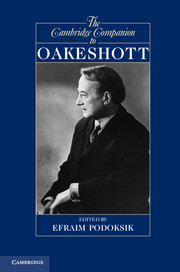Book contents
- Frontmatter
- Introduction
- Part I Oakeshott's philosophy
- Part II Oakeshott on morality, society and politics
- 6 Practical life and the critique of Rationalism
- 7 Oakeshott's ideological politics: conservative or liberal?
- 8 Rhetoric and political language
- 9 Oakeshott's On Human Conduct
- 10 Oakeshott's political theory: recapitulation and criticisms
- Part III Oakeshott and others
- Index
9 - Oakeshott's On Human Conduct
from Part II - Oakeshott on morality, society and politics
Published online by Cambridge University Press: 28 September 2012
- Frontmatter
- Introduction
- Part I Oakeshott's philosophy
- Part II Oakeshott on morality, society and politics
- 6 Practical life and the critique of Rationalism
- 7 Oakeshott's ideological politics: conservative or liberal?
- 8 Rhetoric and political language
- 9 Oakeshott's On Human Conduct
- 10 Oakeshott's political theory: recapitulation and criticisms
- Part III Oakeshott and others
- Index
Summary
INTRODUCTION
Michael Oakeshott published two book-length treatises during his lifetime: Experiences and its Modes (1933) and On Human Conduct (1975). The first of these, discussed in earlier chapters of this volume, presented and defended an idealism that was out of step with the philosophical currents of the time. The second offered a somewhat different understanding of philosophical reflection and a much narrower focus. Instead of seeing philosophy as a concern for the whole of human experience that can be divided into various modes, On Human Conduct takes philosophical reflection to entail ‘a disclosure of the conditions of understanding’. Instead of focusing on the character of experience, On Human Conduct offers a theoretical exploration of human agency and civil association.
In whatever other ways his perspective may have changed in the course of the forty-two years between the publication of these two books, Oakeshott remained deeply sceptical of philosophy's capacity to direct or govern our practical activities. He also remained profoundly committed to a deep form of pluralism, individuality and the capacity of human beings to devise traditions or practices that did not merely regulate but, more importantly, enabled an extraordinary diversity of ways of life. These themes, explored below, provide the backdrop for the vision of political association that forms the core of On Human Conduct.
- Type
- Chapter
- Information
- The Cambridge Companion to Oakeshott , pp. 199 - 221Publisher: Cambridge University PressPrint publication year: 2012



